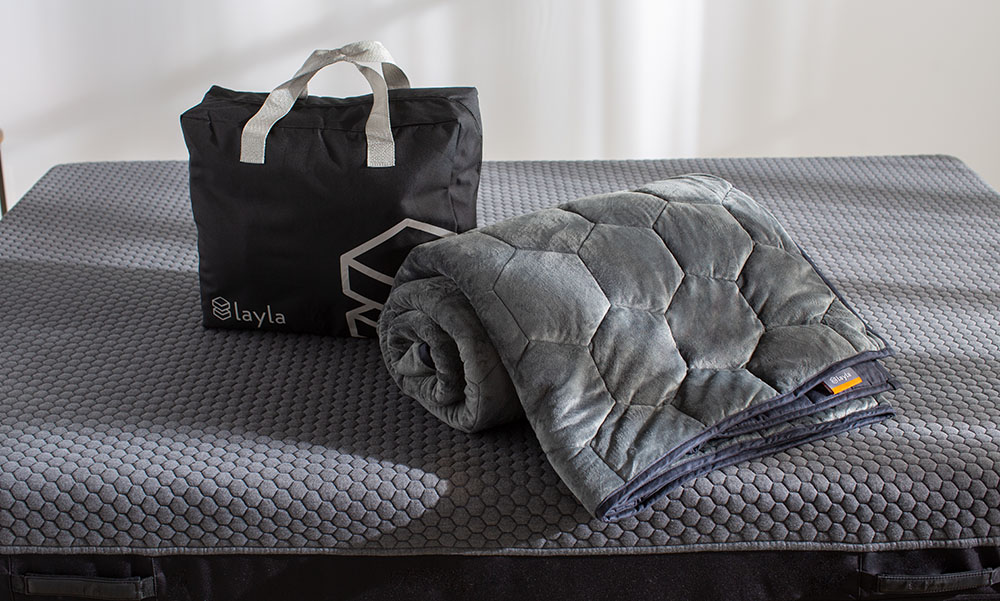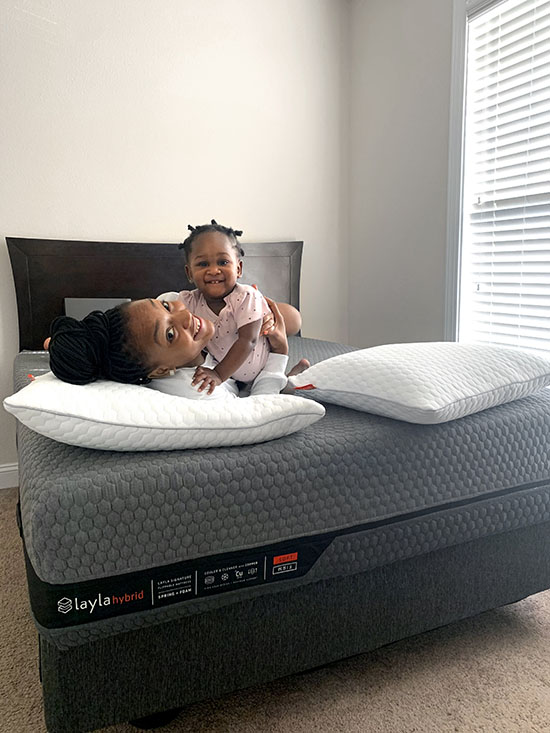As with most things in life, your mattress isn’t immune to aging. If you’re wondering how often you should replace your mattress, now’s probably the time. From an achy back to lack of comfort, there are some tell-tale signs your bed needs to be upgraded. Below, we’ll go over how often to replace a mattress, the signs your mattress needs replacing, and how to make your mattress last.
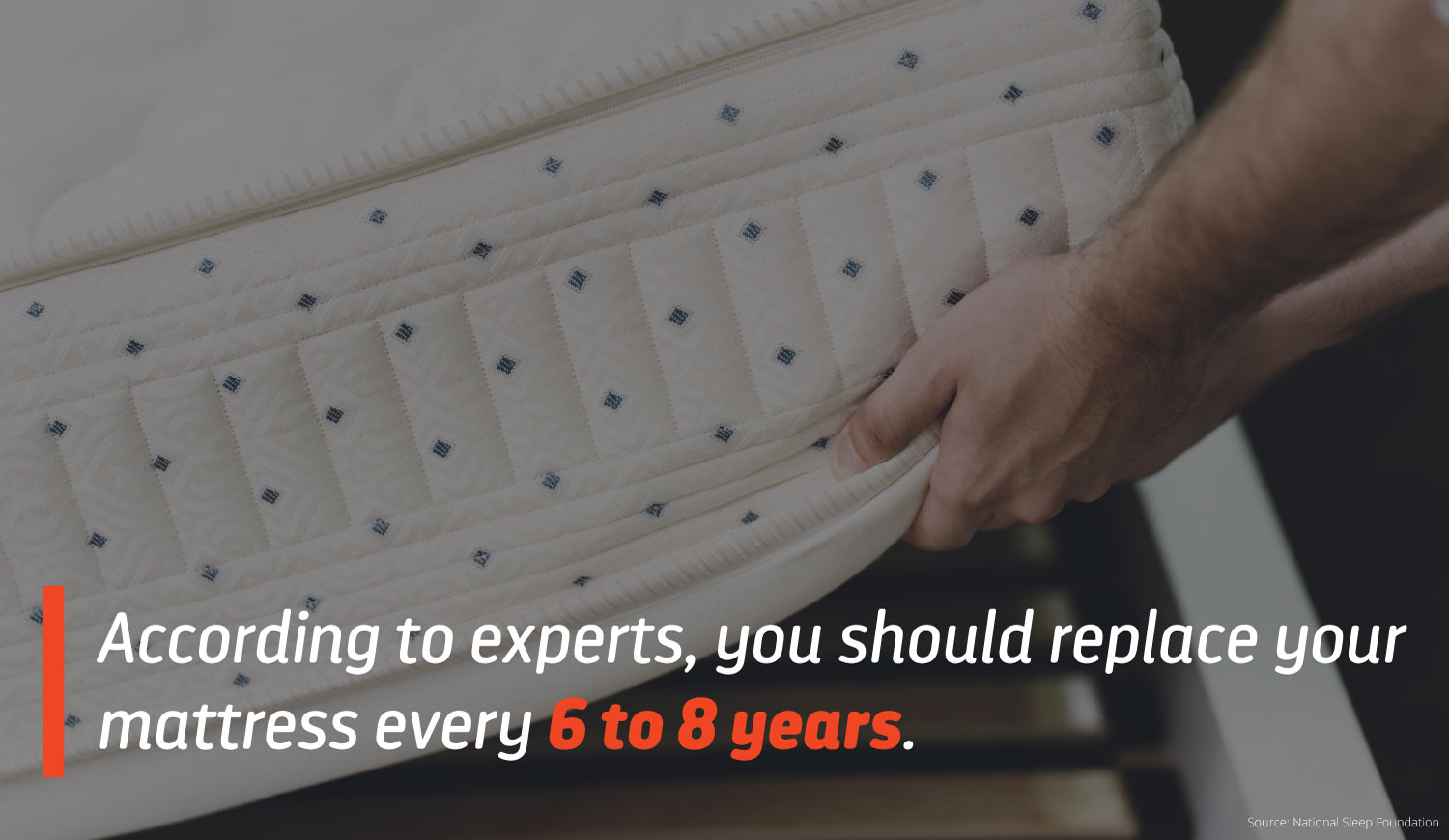
How Often Should You Replace Your Mattress?
So, how often should you change your mattress? According to the National Sleep Foundation, you should replace your mattress every 6 to 8 years. While their recommendation provides a ballpark for when you should replace your mattress, it’s important to remember this is just a rule of thumb. It’s always important to listen to your body, as you may feel you need a new mattress before this timeframe.
How often you should replace your mattress depends on a variety of factors that can increase or decrease the time you own your mattress. How often you use your mattress, the quality of your mattress, and the type of mattress, such as a memory foam or hybrid mattress, are just some of the factors that can tell you when it’s time to go out with the old and in with the new.
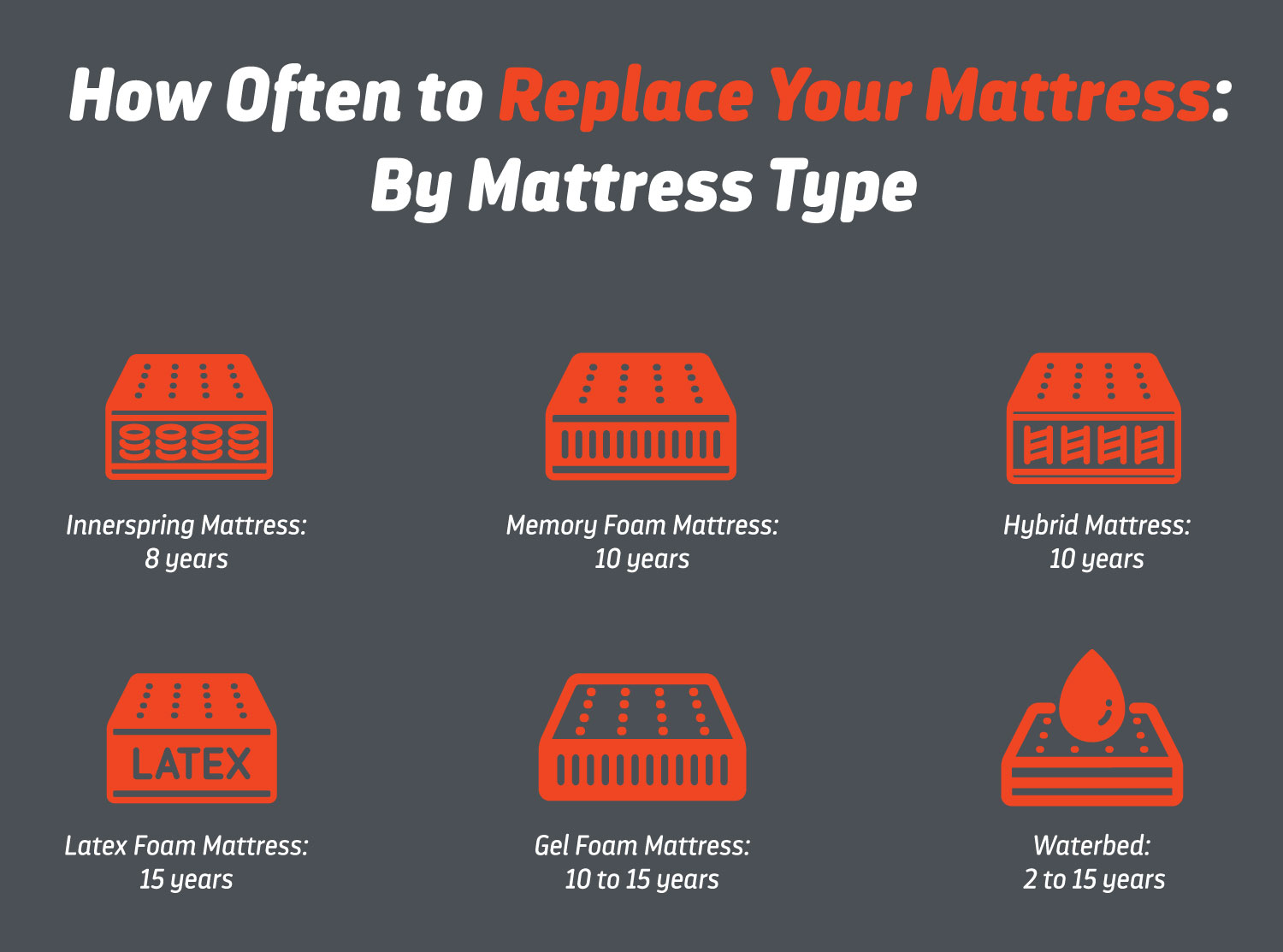
How Often to Replace Your Mattress (By Mattress Type)
The type of mattress you sleep on every night might differ from the type of mattress your neighbors, best friend, or family members sleep on. This means the lifespan of their mattress type may differ from yours.
How often should you replace a mattress based on the type? Take a look at the lifespan of different types of mattresses below:
- Innerspring mattress: 8 years. Innerspring mattresses are comprised of individually pocketed coils that provide comfort and fitness. Over time, these coils can break or lose their spring from continuous pressure every night. Flipping the mattress every now and then can help prolong its lifespan. If you notice any springs or coils that feel broken, it may be time for a new mattress.
- Memory foam mattress: 10 years. Memory foam mattresses are unique in that they use body-contouring memory foam that adapts to the shape of your body while you sleep and returns to its original form once you hop out of bed, year after year. Memory foam mattresses are incredibly durable, and higher-quality memory foam mattresses can last well beyond the 10-year mark. Periodically rotating your memory foam mattress can help even out the concentrations of your body weight. If you notice the quality of the foam is deteriorating, it may be time for a replacement.
- Hybrid mattress: 10 years. A hybrid mattress combines the properties of an innerspring and memory foam mattress. Individually-pocketed coils are placed throughout the mattress, while memory foam fills in the gaps to provide comfort, creating a firm yet plush feel. Hybrid mattresses are durable, and their lifespan can be prolonged by rotating the mattress occasionally. If you notice the springs or foam sagging or losing shape, it’s time to find a new one.
- Latex foam mattress: 15 years. Latex foam mattresses are similar to memory foam mattresses but are made from natural or synthetic latex that has higher levels of elasticity. Degradation over time is possible with latex foam mattresses, just as any type of mattress. Any signs of wear and tear mean it’s time for an upgrade.
- Gel foam mattress: 10 to 15 years. Gel foam mattresses are memory foam mattresses, but with gel beads integrated throughout the mattress, which allows the bed to redistribute heat more easily to keep it cool. The gel foam properties can help make the mattress more durable, which gives it a longer shelf life. Rotating a gel foam mattress can help give you more years of comfort, but once you start noticing the foam breaking down, it’s time for a replacement.
- Waterbed: 12 to 15 years. Waterbeds are unique in that they have a poly-vinyl later that holds in water to create a wave-like motion. While waterbeds are becoming less and less common, they have a relatively long lifespan because there are no springs or foam that are prone to saggings. Signs of aging include the top mattress or vinyl layer wearing out or a hole that causes a leak.
As with all mattresses, the higher the quality, the longer the lifespan. While high-quality mattresses often come with a higher price tag, investing in a top-tier mattress made from durable materials can extend your mattress’s lifespan, which means you’ll have to buy less over the course of your life.
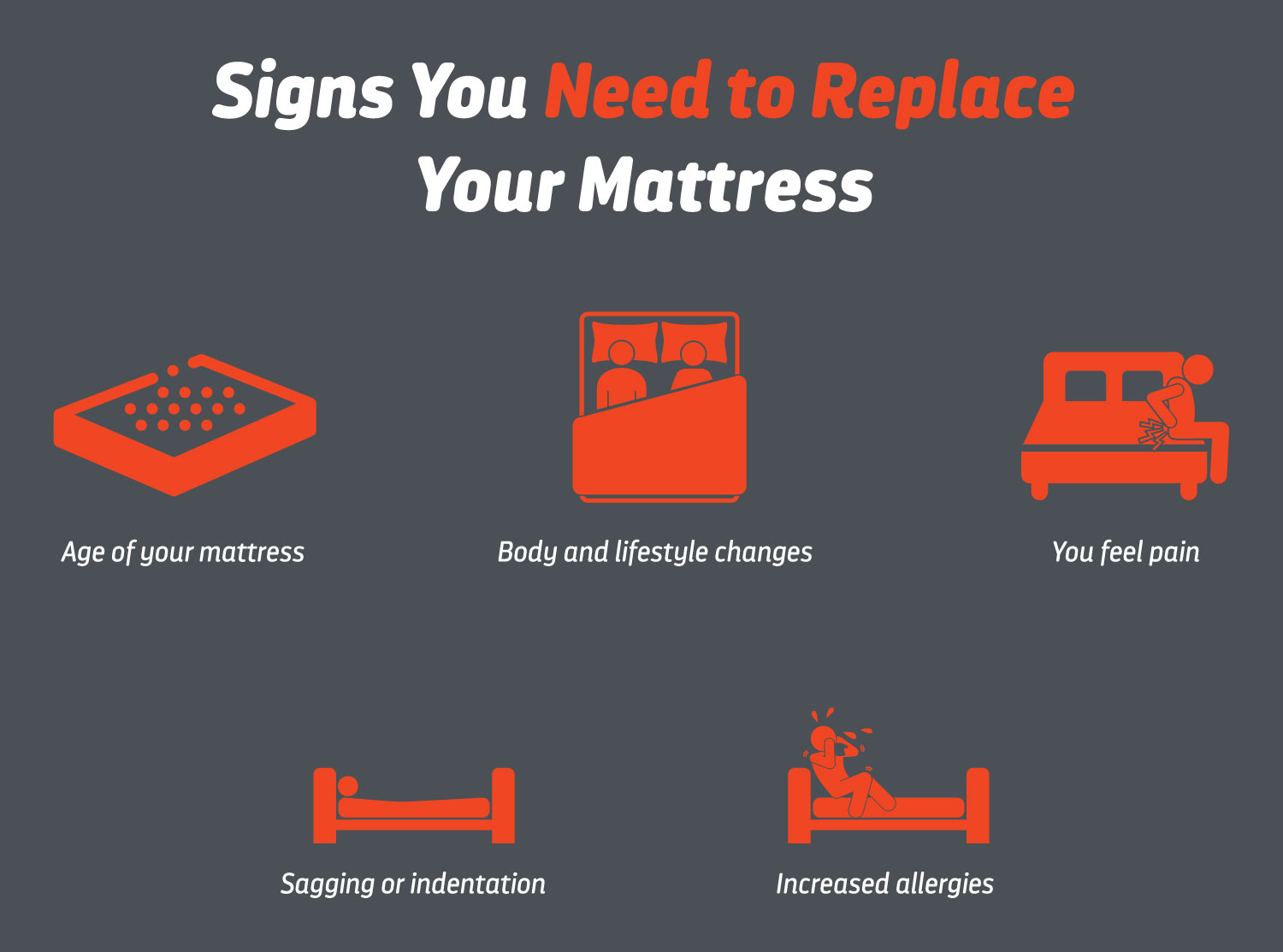
Signs to Replace Your Mattress
Many wonder how often you should replace your mattress. While many sources say 7 years is a reasonable estimate to replace your mattress, there are some revealing signs that your mattress might need to be replaced.
Some obvious signs your mattress need to be replaced include:
1. Age of Your Mattress
How long you’ve had your mattress can be one sign you need a new one. If you’ve been sleeping on the same mattress for years or even decades, it’s most likely worn out and lost its shape and comfort. If your mattress is on the older side, take a look at the next few signs to determine if it’s time to make a swap.
2. Body and Lifestyle Changes
As you age, your body and lifestyle might change. Whether you gained weight or gained a partner, your current mattress might not be getting the job done. Your mattress should be able to withstand pressure and keep you comfortable night after night. However, with more weight added to your bed, the shorter your mattress’s lifespan will be. Not only that, but mattress technology has also probably changed from the last time you bought a mattress, which means a newer mattress may have better support and comfort to help you sleep better at night.
3. You Feel Pain
No one likes waking up with a sore back, stiff neck, or aching muscles. Believe it or not, your mattress could be causing these ailments, not the grueling workout you did hours before bed. The reason your mattress might leave you sore in the morning is that a sagging and worn out mattress makes your muscles work harder to keep you in a comfortable position. This extra strain can leave your hips, back, and shoulders stiff. While a new workout regimen can leave you in a stiff state, make sure to give your mattress a check, too.
4. Sagging or Indentation
If you notice your mattress is sagging in any area or has indentations, it means the coils or memory foam is worn out. Indentations in your mattress can be bad for your health, as it puts your spine out of alignment and doesn’t allow your muscles to relax. To prevent your mattress from sagging or indenting, avoid standing and jumping on it, and rotate your mattress every few months.
5. Increased Allergies
Believe it or not, you’re not alone when you sleep at night. Each mattress is covered with millions of tiny organisms called dust mites, which can cause allergic reactions at night when their feces come into contact with your skin. The longer you have a mattress, the more dust mites and other allergens, such as dead skin cells, pollen, and bodily fluids, it may contain, which can leave you with itchy eyes, a sore throat, and a runny nose.
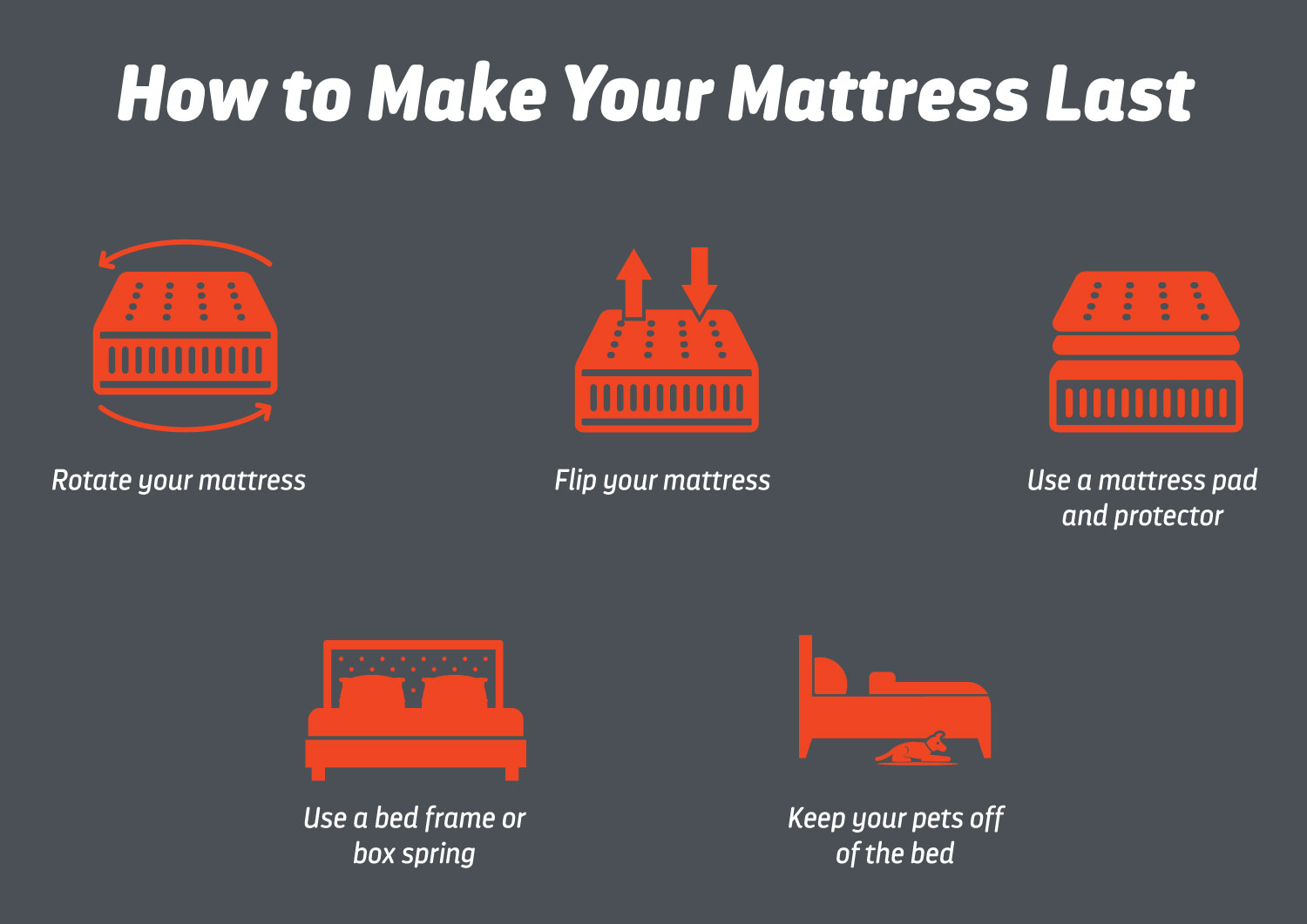
How to Make Your Mattress Last
Mattresses aren’t necessarily cheap, which means you may be holding onto your current mattress for as long as you can to avoid buying a new one.
To keep your health in check while still maintaining a good-as-new mattress, consider these tips:
- Rotate your mattress: If you have a memory foam or hybrid mattress, rotate your bed every few months to prevent pressure from concentrating in one spot.
- Flip your mattress: If you have an innerspring mattress, flip your bed every few months to take the pressure off of the coils and springs.
- Use a mattress pad and protector: A mattress pad and mattress protector can help prolong your mattress’s life. A mattress pad will add another supportive layer that can absorb weight, while a mattress protector creates a liquid barrier, protects your health, and increases mattress longevity.
- Use a bed frame or box spring: Giving your mattress proper support with a supportive mattress base can help your mattress last longer. Most bed frames and box springs last a long time, which means you can use them for multiple mattresses.
- Keep your pets off of the bed: While sleeping with your dog sounds like a dream come true, their paws and teeth can damage your mattress.
While these tips can help make your mattress last, there comes a time when you need to part ways. When you get rid of your mattress for a new one, make sure to discard it properly by bringing it to a mattress recycling center or donating it, if possible.
Buying a Mattress
Have you come to the conclusion that it’s time to replace your mattress? If so, you want to make sure you choose a new mattress that is made from quality materials, durable, and, most of all, comfortable. At Layla Sleep, we offer two premium types of mattresses: our memory foam mattress and our hybrid mattress. For a more cushioned sleep, our copper-gel memory foam mattress will cradle and support you all night long. If you’re looking for a more supportive sleep, our hybrid mattress with an individually wrapped coil system with flippable firmness will be your favorite sleeping companion.
Layla Sleep offers mattresses built to last. Using innovative technological solutions and high-quality materials, you can enjoy a deep sleep night after night when you choose Layla.


